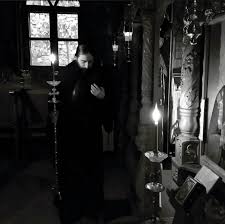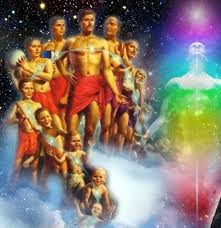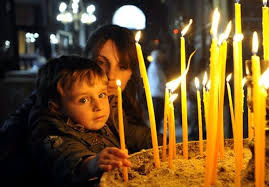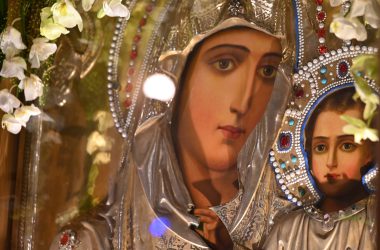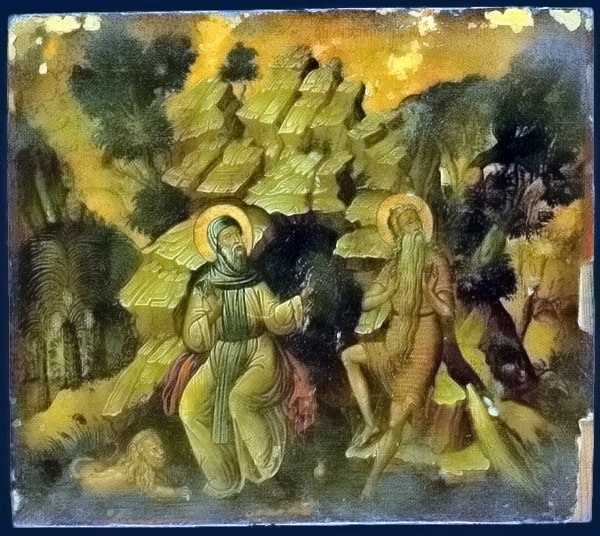Humbleness is God’s garment, says saint Isaac the Syrian and becoming human through it He hides His glory for not burning His Creation when it sees Him. The Holy Fathers distinguish between kinds of humbleness and pride in relation with the man and God. Humbleness begins with the love for the fellow men and involves the acknowledgment of the fact that the source of our entire biological and spiritual life is exterior, is God. But it is not only a comprehensive act of rational understanding but also of knowledge by struggles and strives to gain virtues.
Depending on the spiritual criterion taken into consideration humbleness has more aspects. In accordance with the subject of the relation, the man or God, we distinguish two levels. In this respect abba Dorotheus explained: `The initial humbleness means that someone considers his brother wiser than him and outrunning him in everything and simply expressing it as saint Paul said, by considering himself lower than all the others. And the second humbleness means to consider that God alone is the maker of all good. This is the perfect humbleness of the saints. This is born in the soul naturally by accomplishing the commandments. Thus the saints the closer they get to God the more sinful they see themselves. And saint John Casian reinforces this statement: Nobody can reach the final aim of perfection of purity otherwise than by a true humbleness which he shows towards his brothers and then to God.
The humbleness of the sinner and the pride of the righteous
According to the spiritual level of the God loving man, we can distinguish a humbleness of the sinner who is in course of purification, an intermediary level of the one who still struggles against his passions and a perfect level which belongs to the dispassionate. The sinner who repents humbly in his heart for his mistakes reaches the first step of humbleness.
`You must know, taught saint John Chrysostom, that a humble sinner outruns a proud righteous. Remember the Pharisee and the publican from the Gospel. See what the Pharisee says: ` The Pharisee stood by himself and prayed: ‘God, I thank you that I am not like other people—robbers, evildoers, adulterers—or even like this tax collector.` (Luke 18, 11). Oh, what a foolishness! The pride of this Pharisee did not only make him boast above all the human race but he foolishly despised the publican who was not far from him. In addition to this the saint mentions the reactions of the publican: `He did not answer to the offence with an offence, he did not get mad to offend but suffered everything obediently. By patience the arrow of the enemy became for him a healing remedy which brought him glory and holy wreath. Everyone of us is called to follow the model of the publican not by imitating his sins, but by humble thinking.
At the stage when virtue is not complete, humbleness is at the level of struggling against passions, the mind trying to find reasons for humbling itself. Saint Isaac the Syrian added that humble in his thought cannot be called not even the one who humbles himself recalling his sins and mistakes when he remembers them before feeling his heart crushed and drawing away his proud thoughts when they appear, although this thing is praiseworthy. But if he still has any proud thought it means he did not reach humbleness and tries to gain it by different methods. Even if this thing is praiseworthy however he has not gained humbleness only wants it but he doesn’t own it. The simple fact that sometimes you feel your heart crushed or you cry when you pray it doesn’t mean you’ve reached the height of humbleness. For instance, when you have tears while praying in the presence of other people they might be brought by demons to draw you to vainglory and believe about yourself that you are special and distinguish yourself from the flock of the believers. Completing the words of this struggler for piety, Diadochus of Photice emphasized: `He has a more humble mind because of the weakness of his body or of those who hate without a reason those who are concerned by justice or the fight against the bad thoughts.` Sty this stage sadness and discouragement are still present because of the longing after the earthly happiness. But the one who struggles had to pass through the first to teach the second.`
Humble thinking is the natural quality of the perfect ones
Saint Isaac the Syrian distinguishes as the peak of perfection the supernatural humbleness, charisma which is given to the saints only after they have gained all virtues.
`Only by the accomplishment of virtues humbleness may be reached. The perfect one although he has laudable deeds, hides them and considers himself as being nothing. In the same manner saint John Chrysostom said: Humbleness doesn’t mean a sinner should consider himself being a sinner indeed but true humbleness is when someone knows he did many great good deeds and he doesn’t have any high thoughts about himself, but says as saint Paul: `
`My conscience is clear, but that does not make me innocent.` (1 Corinthians 4, 4). `The holy man does not need to find reasons in his mind to humble himself, but gained this in all these in a perfect natural way without forcing himself, saint Isaac the Syrian added. Since he received it in himself as a great charisma. This humbleness is present in his heart not by a rational mental effort but longingly. `The perfect humbleness appears when the mind is enlightened by the divine grace by feeling and perfect confidence`, saint Diadochus of Fotice confirmed. Then `the soul has humble thoughts as a natural attribute, since being filled by divine kindness he cannot be influenced by vainglory even if he fulfilled without cease the commandments of the Lord but considers himself more humble than all the others because of the communion with the divine kindness. In this situation the spiritual athlete is not impressed anymore by the riches of this world and doesn’t feel the terrible arrows of sin.`
We find an apparent humbleness at the man who temperamentally is meek and quiet but has not spiritual strife. Because he writes: `Not everyone who is meek and quiet or understanding and gentle by nature reached the stage of humble thinking.` As saint Isaac the Syrian remarked the man learns only by trials. And without trial he doesn’t know humbleness.` And Diadochus of Photice said that `we could not reach the brightness of humbleness if the grace did not soften us bringing upon us the educative pains to make manifest our free will.` For reaching humbleness it is not enough to read books or invoke in our mind humble thoughts. It is necessary to acknowledge thoroughly that we cannot do anything good without God. But we must first pass through the oven of misfortunes to feel our helplessness and increase our prayers asking for the divine help. `And when someone knows that he missed God’s help he prays a lot and the more he multiplies them the more humble he becomes in his heart. Since as saint Isaac the Syrian noticed that it’s impossible not to humble yourself when you pray and demand. ` A broken and contrite heart God will not despise.` (Psalm 50, 19) Farther on this long spiritual way the heart humbles itself by pains and educative abandons from God which results in making the thoughts from our mind stop wandering: `Since humbleness makes the mind become focused.`
Thus the humble man is focused, recollected and prays with his mind undissipated. The gain of this focused prayer is the fact the heart feels God’s help. Because it finds a trustworthy power moving in itself. Sand when the man feels the divine help being present there helping him, his heart fills with faith and he understands by this that the prayer is the means through which he finds help and spring for salvation.
The devil is helpless when he is confronted with humbleness
Many trials and temptations are brought by God against those who love Him. Thus many times He frightens them with the natural passions and with the dirty ugly thoughts and sometimes with diseases and infirmities. Other times with poverty with the lack of the bare necessities. And other times with the pains of a terrible fright, with the abandonment and with the visible fight coming from the devil by which He uses to frighten them. And some other times by many terrible things. These misfortunes are the spiritual bell by which God calls His lovers not to fall into the sleep of idleness or because the struggler is vulnerable to some things or for waking the fear of what is to come in the future.
As a result of this the more awake we are the less idle in using our mind the more humble we are, the more thankful and we have the presence of spirit to blame ourselves for the evil we suffer. Because of our pride many misfortunes strike us so that the mind should be awake. While doing good deeds the man must also be alert all the time and protect his soul and think that he is a created being vulnerable to any fall. Since everyone being a created being needs God’s power to help him.`
The man with a humble heart doesn’t oppose another man using the shield of his pride to protect his hurt selfishness. The humble one cannot be hurt, upset, angered. But in the heart of the proud it grows the `tree of misdeed` mentioned by Mark the Hermit who spoke about the passions of sadness, anger and distress. We very often ignore this subtle connection between pride and a common sadness, distress or anger. The humble man is peaceful but the proud one causes conflicts: `Many quarrels are caused by pride, but wisdom is with the one who listens the advice. (Proverbs 13, 10) The humble one is loved by God by men and even the wild beasts that bend their heads and lick his feet and hands because from them comes that scent diffused by Adam before the fall.
More than this saint Isaac the Syrian said: even the devils despite all their evilness, pride and cruelty when they approach him become powerless. And all their cunning is annihilated and their scheming vanishes and their misdeeds stop. But the proud one is in conflict with God and people (Luke 26, 41) His despising look, his proud walk, his arrogant defiant ironical malicious sarcastic talk attract only the evil spirits who make him a vessel of their evilness. Moreover the proud one will not need any devil. Because he is a devil and an enemy himself and he fights against himself` added saint John Chrysostom. The proud man doesn’t know himself at all, saint John Chrysostom remarked, since he attributes to himself qualities that are gifts from God.
`What do you have that you did not receive? And if you did receive it, why do you boast as though you did not?` (I Cor. 4, 7), saint apostle Paul asked the proud one. On the contrary the humble one said saint John Cassian refrains from pride whenever he does good deeds saying to himself: `Without me you cannot do anything.`(John 15, 5) or `If the Lord did not build the house, the builders would try in vain.`(Psalm 26, 1), or `It does not, therefore, depend on human desire or effort, but on God’s mercy.` (Romans 9, 16).
Vainglory and discretion
Besides these the proud one seeks to be recognized, admired, appreciated and honored by men. This is the passion of vainglory characterized by saint John Chrysostom as being the `waste of our toils, the loss of our efforts, the relative of disbelief, the forerunner of pride and the wreckage of the vessel in the port.` According to saint John Cassian vainglory is considered as the beginning of pride, passion which wars especially the perfect ones who defeated the passions of debauchery and anger. The humble man is only a presence who becomes visible by his material but absolutely discrete gestures. He doesn’t compare himself with anyone else but himself and considers himself a sinner and thinks he doesn’t do anything good. Saint Peter the Damascene advised to be followed this spiritual model: If someome has all the physical and spiritual virtues he should consider he owes it all that to God as one who took many by grace being unworthy of that.`
And saint Isaiah the Hermits adds: `Humbleness means when someone doesn’t compare himself to see what level he reached by one of his deeds, in looking at it, at its greatness and ignore that. Humbleness means as well: not to argue, to have obedience, to keep your look down, to have your eyes shut, to refrain from lying, from prattling, from opposing others, to toil a lot, to suffer offences, to hate rest and never upset anyone.` Moreover one of the qualities of humble thinking according to the same spiritual writer consists in giving up at one’s own will favouring the neighbor consciously with discernment.
The healing of pride
Saint Basil the Great appreciated that the proud one `heals himself if he believes in the words of the one who said: `God is against the proud and He gives grace to the humble.` (Iac. 4, 6), in other words meaning to be afraid of the way it will be judged pride.` Our Lord Jesus Christ warns us about the sad consequences of pride: ` Whoever exalts himself shall be humbled; and whoever humbles himself shall be exalted.(Matthew 23, 12; Luke 14, 11).
And Mark the Ascete said: `When you see a thought promising you vainglory be sure it prepares shame for your.` Pride as well as humbleness has two forms:
one when you consider yourself above other people and despise them and another when you consider you owe to you your physical, intellectual, spiritual, material and social gifts and successes.
When the man focuses on the brightness and the beauty of the other one without looking at his flaws, he has the chance to avoid the first form of pride.
More than this, as abba Dorotheus teaches us: `to consider yourself below all the others opposes the first kind of pride. Since how can someone who considers himself below all the others see himself above his brother or defame him, or despise him. In the same time the accept of the offences, of the disgrace and defamations are healing remedies for pride.` And the second kind of pride heals by ceaseless prayer: `The one who prays without cease to God becomes worthy to succeed in something, he knows where his help comes from and he cannot boast himself or consider that his achievements were his merit, only thinks that he owes them to God and is always thankful to Him and always pray to Him fearing not to lose His help and see himself weak and helpless.` Pride unlike other passion cannot be healed by personal efforts.
Saint John Chrysostom left us a word which until now arouses in everyone of us a positive uneasiness : `The intemperate may be healed by men, the cunning by angels and the proud ones only by God.` Let’s walk every day in the spirit of humbleness which doesn’t mean to place ourselves below the others which implies a kind of choreography meaning to descend from a higher place. The humble man does not descend from somewhere, but admits with spiritual objectivity to be the last of all. Saint Makarios said `the humble never falls, where could fall that one who is below all?`.
Humbleness doesn’t mean that a sinner should consider himself a true sinner but real humbleness means when someone knows he did many great deeds and he doesn’t think anything great about himself only says as saint Paul:
`My conscience is clear, but that does not make me innocent.` (1 Cor. 4, 4).”
Saint John Chrysostom




